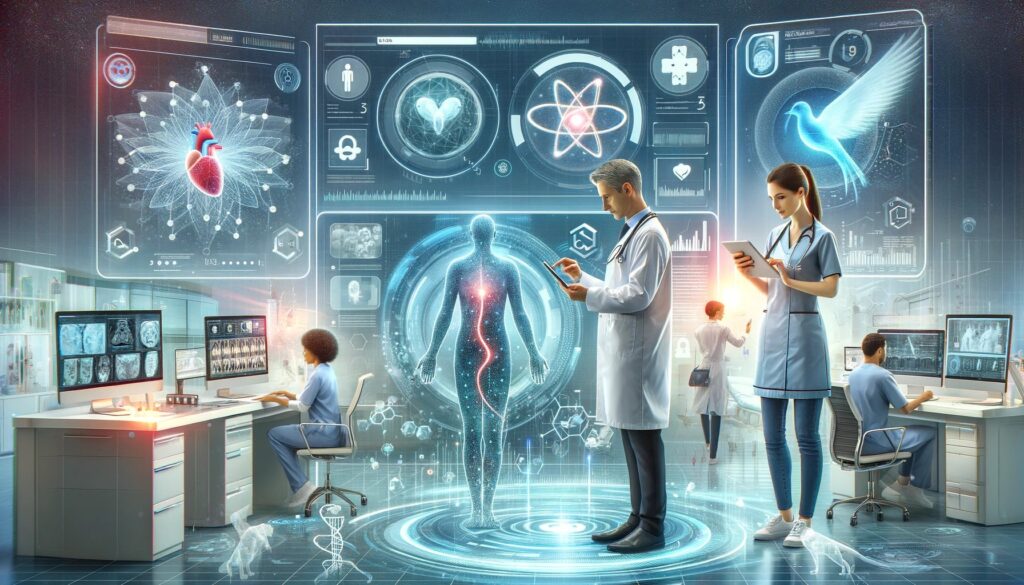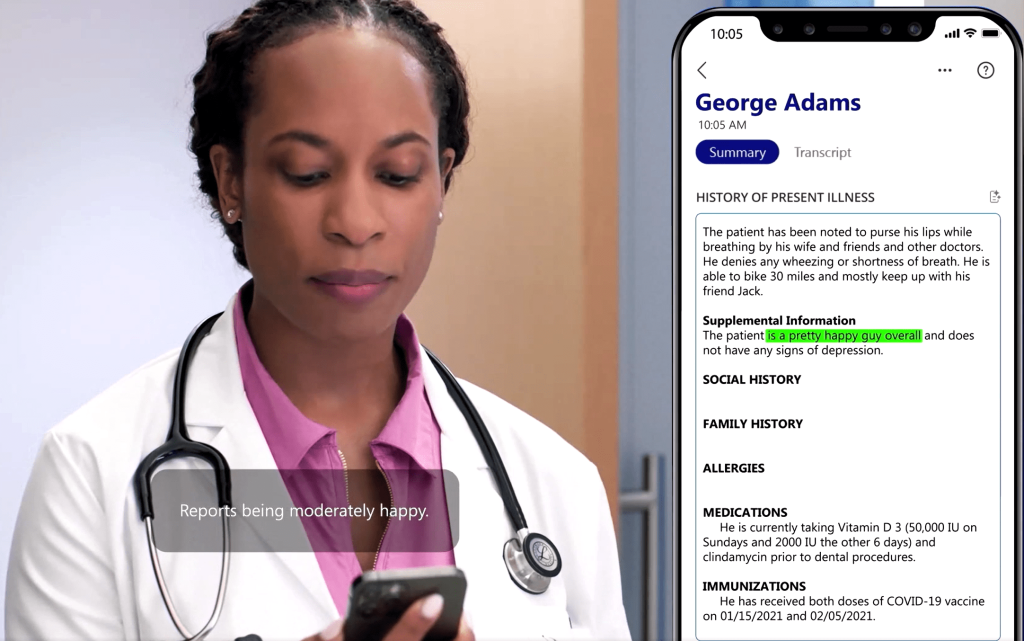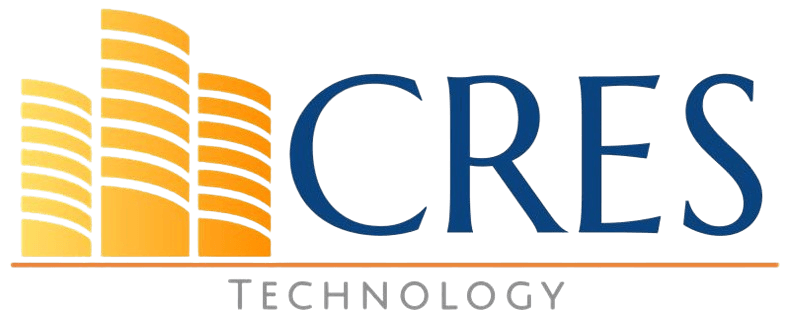
It seems like everyone is talking about AI these days, from your talkative neighbor to the CEOs of large corporations. The sudden surge in the mainstream popularity of artificial intelligence (AI) has been nothing short of remarkable. From chatbots to recommendation systems, AI is transforming industries across the board. OpenAI has been a major player, with ChatGPT making waves and Microsoft integrating its Copilot features. Other tech giants aren’t far behind, each rolling out their versions of AI tools that promise to revolutionize our daily lives. In this comprehensive guide, we’ll explore the impact of generative AI on healthcare, its benefits, and how healthcare professionals can prepare for the AI transformation.
The Evolution of Generative AI in Healthcare

- The Past: In the past, healthcare applications of AI were limited to basic data analysis and automation of routine tasks. These early efforts laid the groundwork for what was to come.
- The Present: Today, with advancements in machine learning and natural language processing, AI can assist in complex diagnostics and personalized treatment plans. One notable example is the DAX tool, which was introduced through a collaboration between Microsoft and Nuance. This AI-powered clinical documentation tool leverages conversational AI to capture patient encounters and automatically generate medical documentation, significantly reducing the administrative burden on healthcare providers.
- The Future: In healthcare, we are seeing applications on the horizon, ranging from medical image analysis to drug discovery. Imagine AI-generated personalized treatment plans, early disease detection, and optimized clinical workflows. Further in the future, AI will predict patient outcomes based on vast datasets, and even assist in robotic surgeries.
Benefits of AI in Healthcare

The benefits of AI in healthcare are manifold. Here are some key advantages:
- Enhanced Diagnostics: AI can analyze medical images, lab results, and patient histories more quickly and accurately than humans, leading to faster and more precise diagnoses.
- Personalized Treatment: By quickly analyzing individual patient data, AI could assist providers in developing personalized treatment plans tailored to each patient’s detailed history and unique needs.
- Operational Efficiency: AI can automate administrative tasks, streamline workflows, and improve overall hospital management, freeing healthcare professionals to focus on patient care.
- Predictive Analytics: AI can predict disease outbreaks, patient admissions, and potential complications, enabling proactive healthcare management.
How is AI used in Healthcare?
AI is now being introduced in healthcare in various ways to improve patient care, streamline operations, and advance medical research. Some key applications include:
- Diagnostics and Imaging
- Personalized Medicine
- Predictive Analytics
- Administrative Tasks
- Virtual Health Assistants
- Drug Discovery and Research
Potential Impact of Artificial Intelligence on Healthcare
Predictions for How AI Could Change Healthcare Delivery
Generative AI has the potential to revolutionize healthcare delivery. Imagine a future where AI-driven chatbots provide 24/7 patient support, virtual assistants help doctors with complex surgeries, and AI systems predict and prevent diseases before they become serious health issues.
The Potential for AI to Improve Patient Outcomes
AI’s ability to analyze vast amounts of data quickly can lead to early detection of diseases, more accurate diagnoses, and personalized treatment plans. For example, AI algorithms can analyze medical images (such as X-rays and MRIs) faster and more accurately than humans. Early detection of diseases like cancer becomes more feasible. These improvements can significantly enhance patient outcomes, reducing mortality rates and improving quality of life.
Ethical Considerations and Patient Privacy
While the benefits are immense, there are ethical considerations to address. Patient privacy is paramount, How do we balance patient privacy with data-driven insights? AI systems must be designed to protect sensitive health information. Transparent algorithms, robust data security measures, and clear regulatory frameworks are essential to ensure the ethical use of AI.
Preparing for the AI Transformation
How Can Healthcare Professionals Adapt to AI Advancements?
Healthcare professionals must embrace continuous learning to stay abreast of AI advancements. This includes understanding how AI tools work, their potential benefits, and their limitations. By integrating AI into their practices, healthcare providers can enhance their efficiency and effectiveness.
The Role of Education and Training in AI Readiness
Educational institutions and training programs must evolve to include AI in their curricula. This will prepare the next generation of healthcare professionals to work seamlessly with AI technologies. Ongoing training and certification programs for current practitioners are also crucial.
Policy and Regulatory Considerations for AI in Healthcare
Governments and regulatory bodies must establish clear guidelines for the use of AI. This includes ensuring patient data privacy, setting standards for AI algorithms, and monitoring the ethical implications of AI applications. Policies should foster innovation while safeguarding the public interest.
Conclusion
The DAX tool introduced by Nuance in collaboration with Microsoft is just one example of how AI is shaping the healthcare landscape. Generative AI in healthcare is not just a buzzword; it is a reality that promises to transform the way we deliver and receive medical care. Like any new disruptive technology, there is initial apprehension which is natural. However, by learning more about AI, we can harness its full potential to benefit healthcare. As we navigate this exciting frontier, it’s crucial to balance innovation with ethical considerations, ensuring that AI advancements lead to better patient outcomes, enhanced healthcare delivery, and a healthier future for all.
How we can help:
We are a technology company with deep expertise in IT services and software solutions. We already have a significant number of our customers from the healthcare industry, including large healthcare networks and individual clinics. With our technology specialization and knowledge of the healthcare industry, we can help you overcome your operational challenges. We can also enhance your productivity by implementing solutions that consolidate your data, documents, business processes, and business intelligence.
Many of our prospective healthcare clients struggled with managing their data and documents and finding experienced people to manage their IT. As their organizations grew, so did their operational and productivity challenges. This is where our services benefit our customers.
Our service approach is to be proactive. This means we take action to prevent problems, unlike most MSPs. Our goal is to have the least number of support tickets, which can only be accomplished by being proactive.
About Irfan Butt

CRES Technology – Founder and CEO
A strategic leader with over twenty years of progressive experience in Business Administration, Finance, Product Development, and Project Management. Irfan has a proven track record in a broad range of industries including hospitality, real estate, banking, finance, and management consulting.





